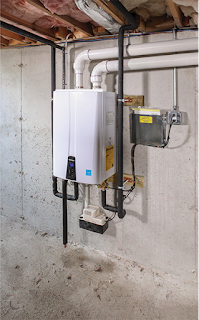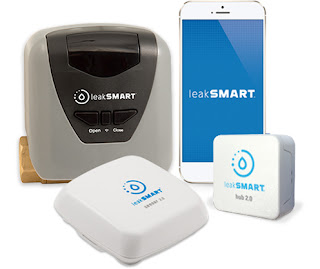It is finally starting to turn the corner towards warmer weather and sunshine in Ohio. Spring cleaning gets on the minds of many. If that's you, don't forget about taking care of your plumbing too! Taking the time for these tips can save you a lot of hassle in the future!
In the basement:
In the basement:
 |
| Tankless Water Heater |
- Check
the temperature setting on the water heater. It should be set no higher
than 120°F to prevent scalding and reduce energy use.
- Carefully
drain several gallons from the water heater tank to flush out corrosion
causing sediment, which reduces heating efficiency and shortens the life
of the heater. Check your water heater manufacturer 's website for
specific instructions concerning your make and model.
- Consider
replacing a water heater more than 15 years old. (The first four numbers
of the serial number represent the month and year it was made.) Newer
water heaters are more energy efficient. Consider going tankless!
- Make
sure flammables are not stored near the water heater or furnace.
- Check
dishwasher, washing machine and ice maker supply hoses for bulges or
leaks. Replace hoses showing signs of weakness or older than ten years.
Use stainless steel hoses wherever possible. They are more reliable and
less prone to bursting than other types.
- Clean out washing machine lint trap, if equipped, and place a wire trap or a piece of pantyhose over the end of the hose that drains the washer.
Outside or in the garage area:
- Pour a
gallon of water into infrequently used drains (including floor drains) to
fill the trap and prevent odors from entering the house. Slow floor drains
should be snaked to ensure they will carry away water quickly in the event
of a flood.
- Check
exposed pipes under sinks and in the basement for signs of leaks.
- If
your home has a sump pump, make sure it operates properly by pouring a few
buckets of water into the sump pit. The pump should quickly turn on,
discharge the water then shut off without any problems.
- Install
a backflow valve in the floor drain if you live in an area where sewers
sometimes backup into homes. This device will prevent future backups.
- Inspect
for slow leaks in your home by taking a reading on your water meter before
bedtime. The next morning, without using any water overnight, take another
reading. If the reading has changed you have a leak that should be
repaired.
- Install
flood alarms. Like a smoke alarm, a flood alarm is a battery-operated
device that sounds an alarm when it comes in contact with water. It alerts
you to potential flooding or leaks.

Flood Alarm
Comments
Post a Comment